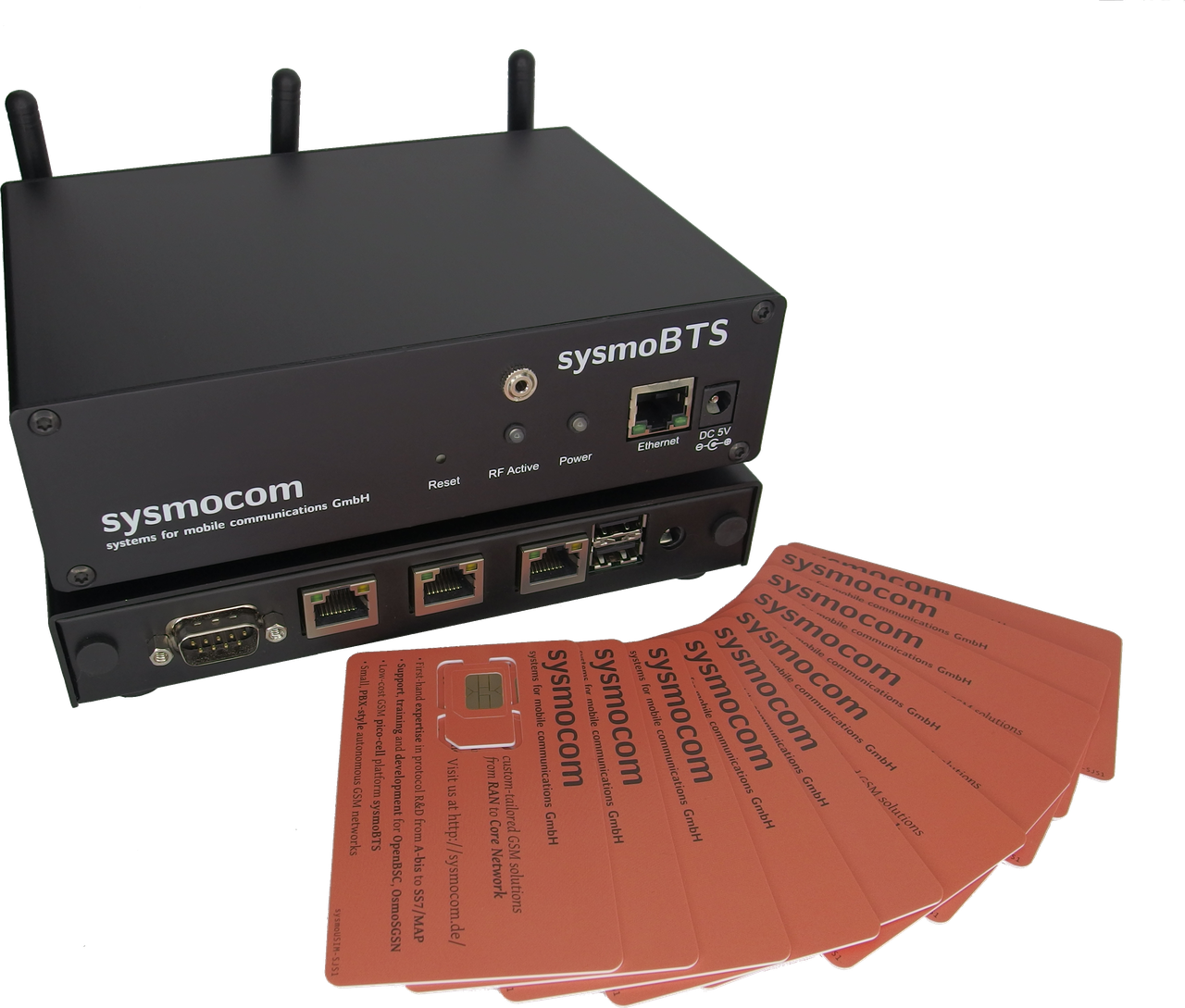sysmoNITB 2G starter kit
2G out of the box
(Download the Data Sheet)

The sysmoNITB 2G starter kit is the combination of a sysmoNITB 2G and a sysmoBTS 1002 to provide a ready to run pre configured 2G network. Although the 2G NITB could even run directly on the sysmoBTS products, the usage of a dedicated NITB provides several advantages like
connection of more than one BTS
traffic monitoring on Abis interface
multiple Ethernet ports for the NITB
more computing power
The starter kit is suitable for a wide range of applications, including
IoT Testing for 2G based solutions
2G related research and development
Production testing of 2G terminal equipment
Rapidly deployable 2G networks
Private 2G networks (PBX style use)
In-building coverage/capacity extension
-
Remote area 2G deployments, utilizing any IP-based satellite back-haul service
Benefit from sysmocom's world-class experience in all areas of cellular networks from RAN to core network, permitting flexible integration of other network elements like BSC into the BTS itself.
Starter Kit for product evaluation
The sysmoNITB 2G starter kit enables you to get quickly started and run a completely autonomous GSM network without the need for any external components. All you need to do in order to make calls and send SMS between your phones n this private GSM network is to
unpack the starter kit
connect the power supply and the antennas,
connect the sysmoNITB 2G with the sysmoBTS 1002 and (if desired) the internet gateway
insert the SIM cards into the telephones
-
power on the phones
The starter kit includes
One sysmoNITB 2G
One sysmoBTS 1002, indoor enclosure, 23 dBm transmit power (configurable down to 0 dBm)
Three compatible SMA rubber antennas
One international power supply (110 to 240 V AC, 50/60Hz, EU/US/UK plug)
20 pre-provisioned SIM cards (10 3FF, 10 4FF)
Printed copy of the sysmoBTS Getting Started Guide
Fully installed + configured software image with OsmoBTS and Osmocom CNI software
Customer-specific factory configuration of transmit band, ARFCN, transmit power, MCC, MNC and other parameters
4 hours of remote support by sysmocom staff (e-mail based, remote login/configure)
USB-cable for access to serial console
Technical Data
Mechanical / Electrical specification sysmoNITB 2G
Dimensions of enclosure (W x H x D) |
168 x 28 x 160 mm (excluding power supply) |
Weight |
450 g (excluding power supply) |
Abis Interface |
RJ45 Ethernet (1000-Base-Tx) |
External Interface |
RJ45 Ethernet (1000-Base-Tx) |
Management Interface |
RJ45 Ethernet (1000-Base-Tx), DB-9 RS-232 |
CPU / SoC |
1 GHz dual-core 64bit AMD G series T40E |
Input Voltage |
12V DC, maximum 12W |
Cooling |
Passive. Active cooling optionally available depending on customer-specific enclosure or environmental requirements |
Internal Memory |
2 GB RAM, 16 GB Flash (SSD) |
Operational Temperature |
0 to 50 °C |
Mechanical / Electrical specification sysmoBTS 1002
Dimensions of enclosure (W x H x D) |
165 x 125 x 59 mm (indoor / table-top enclosure) |
Dimensions of PCB assembly |
160 x 120 x 40 mm |
Weight |
650 g (with metal enclosure), < 200 g (PCB assembly) |
RF Input (SMA) |
GSM 850/900/1800/1900 quad-band uplink band
Sensitivity: -109 dBm (exceeding 3GPP TS 05.05 pico
TS requirements)
|
RF Output (SMA) |
GSM 850/900/1800/1900 downlink band
Max. output power:
(850/900): 23 dBm GMSK, 20 dBm 8PSK
(1800/1900): 23 dBm GMSK, 20 dBm 8PSK
|
CPU / SoC |
TI Davinci (ARM926 @ 405 MHz + DSP @ 804 MHz) |
Input Voltage |
5 V (DC), power consumtion: <= 10W (typ.), 13W (max.) |
Cooling |
Passive. Active cooling optionally available depending on customer-specific enclosure or environmental requirements |
Internal Memory |
128 Mbyte SLC NAND Flash, 128 Mbyte DDR2 SDRAM, microSD socket |
Communications Interface |
RJ45 Ethernet (100-Base-Tx) |
Software / Logical specification
Number of Transceivers |
1 TRX / 8 timeslots |
Supported timeslot configurations |
CCCH, CCCH+SDCCH/4, SDCCH/8, TCH/F, TCH/H, PDCH |
Back-haul (Signaling) |
A-bis according to TS 08.58 and TS 12.21, encapsulated over TCP/IP; Gb (NS/UDP/IP) for GPRS |
Back-haul (voice) |
RTP/UDP/IP with FR/EFR/AMR payload according to IETF and ETSI specs |
Ciphering |
A5/1, A5/2 and A5/3 |
GPRS/EDGE |
GPRS PCU with limited feature set. Initial EDGE implementation. |
Max. concurrent calls |
14 (TCH/H on 7 timeslots) |
Max. simultaneous SMS |
60 (7*SDCCH/8 + 1*SDCCH/4) |
Operating System |
Embedded Linux (Poky based) |